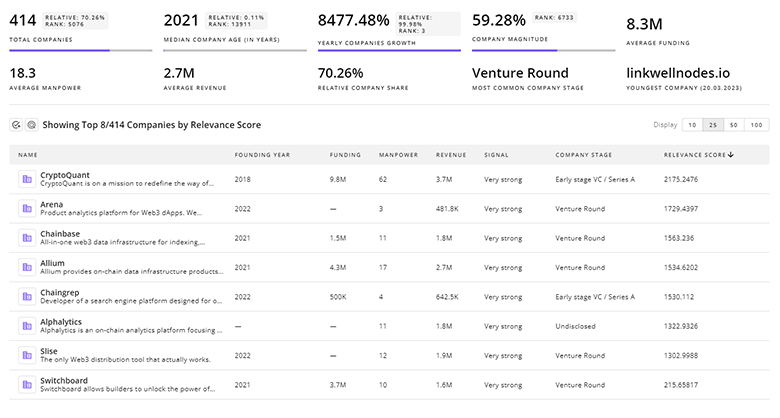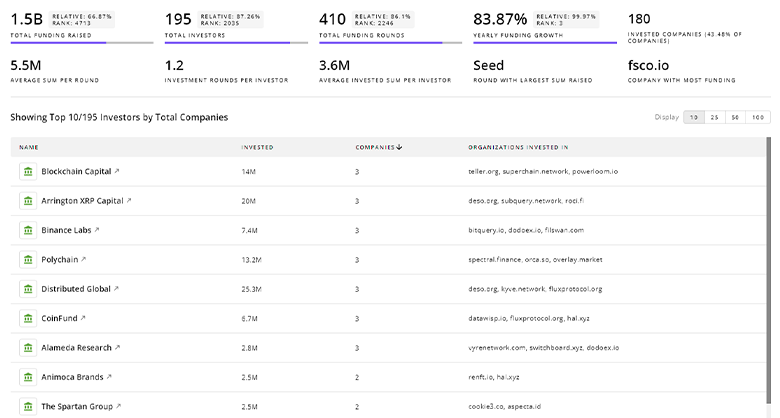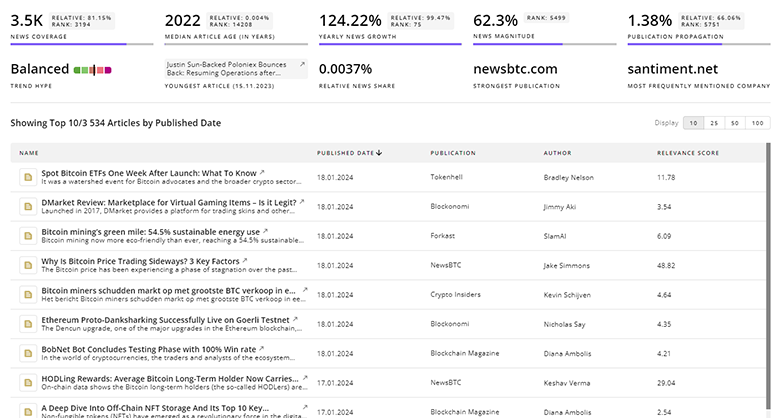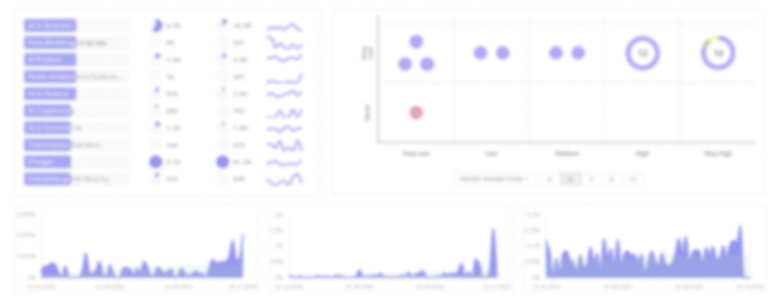
Future Of Work Report
: Analysis on the Market, Trends, and TechnologiesThe future of work now demands immediate strategic action: 32,209 companies operate in this topic and the market shows rapid company formation and high activity in skills and workplace software, signaling a large addressable ecosystem for solutions that tie skills intelligence to operational workflows Strategic Intelligence: The Future of Work. AI and automation will reconfigure tasks at scale — analysts estimate roughly 30% of tasks are likely to be affected in the near term — while hybrid models, reskilling, and employee well-being form the main commercial levers organizations must deploy to maintain productivity and talent resilience imd.org.
This article was last updated 110 days ago. If you find any info is missing, let us know!
Topic Dominance Index of Future Of Work
The Dominance Index of Future Of Work looks at the evolution of the sector through a combination of multiple data sources. We analyze the distribution of news articles that mention Future Of Work, the timeline of newly founded companies working in this sector, and the share of voice within the global search data
Key Activities and Applications
- AI-assisted skills measurement and targeted upskilling programs that map granular skills to internal roles and external labor demand; these platforms enable precision reskilling and internal talent mobility .
- Design and rollout of hybrid-work policies plus tooling for parity between remote and on-site employees to avoid a two-tier workforce and support coordinated collaboration .
- Continuous micro-learning and adaptive learning pathways tied to measurable business outcomes, increasing learning throughput and shortening time-to-expertise .
- Workforce orchestration via cloud-native scheduling, AI matching, and on-demand talent marketplaces to manage flexible capacity and reduce vacancy-driven productivity loss .
- Employee well-being and human-centric experience programs that measure burnout risk and link interventions to productivity metrics and retention
Emergent Trends and Core Insights
- Acceleration of AI as a collaborator not just a tool: enterprises plan wide AI adoption for decision support, automation, and agentic workflows that will reassign 30 to 40% of routine tasks, forcing rapid role redefinition and new governance needs.
- Skills-first labor models replace rigid role definitions: skills passports, atomic skill taxonomies, and real-time labor-market alignment become the operating model for mobility and hiring skyhive.ai.
- Hybrid permanence with parity risk: leaders increasingly treat hybrid as default; organizations that do not invest in parity tooling risk productivity and attrition penalties marketresearch.com.
- Frontline and deskless digitalization: connected-worker and cloud workforce platforms expand to bring scheduling, safety, and learning to distributed operational workers, with high CAGR expectations in those segments marketresearchfuture.com.
- Learning and culture as competitive advantage: firms investing in continuous learning and cultural redesign outperform peers on measurable business outcomes; investment in learning technologies correlates with higher productivity and retention.
Technologies and Methodologies
- Generative and conversational AI integrated with enterprise systems for meeting summaries, code assistance, and personalized learning recommendations .
- Skills intelligence stacks that combine skills ontologies, assessment engines, and labor-market signals to enable precision internal mobility and sourcing .
- Cloud-native workforce orchestration platforms with AI scheduling, predictive staffing, and payroll integration to manage gig, hybrid, and permanent workers .
- Immersive simulation and VR-based training for faster procedural skill acquisition and safer frontline upskilling .
- People analytics combined with well-being telemetry to connect engagement, burnout risk, and productivity into actionable HR interventions
Future Of Work Funding
A total of 5.5K Future Of Work companies have received funding.
Overall, Future Of Work companies have raised $944.8B.
Companies within the Future Of Work domain have secured capital from 18.8K funding rounds.
The chart shows the funding trendline of Future Of Work companies over the last 5 years
Future Of Work Companies
Workera — Workera provides skills intelligence and atomic-level skills measurement to help enterprises target precision upskilling and talent mobility; their platform supplies assessments across 100+ domains and supports data-driven talent strategies for innovation-led teams.
Insight: Workera links measurable skill profiles to hiring and internal mobility, making it a practical vendor for companies that must quantify skill gaps before large reskilling investments.PatternAI, Inc. — PatternAI builds a personal conversational AI "robot" for knowledge workers that attends meetings, summarizes content, and surfaces action items; the company targets productivity augmentation with privacy and enterprise-grade security.
Insight: PatternAI exemplifies the shift toward personal AI assistants that reduce cognitive load and accelerate knowledge work, positioning itself in the workflow layer where AI produces direct time savings.FutureFit AI — FutureFit AI offers an AI-driven career-navigation platform used by governments and large enterprises; it maps 350M+ talent profiles and live labor-market signals to recommend personalized career paths and learning roadmaps.
Insight: FutureFit AI operationalizes outplacement, upskilling, and internal mobility at scale, making it a strong partner for organizations facing large redeployment or restructuring events.JobKred — JobKred combines AI and workforce analytics for personalized learning, rapid transformation, and talent mobility; the platform claims major time and cost savings for enterprise skills programs and serves governments and universities.
Insight: JobKred demonstrates a fast-to-value model for enterprises that need rapid skills benchmarking and pathway creation with measurable implementation timelines.From the Future — From the Future integrates AI and VR to create immersive simulations for skilled-trades training; their approach accelerates mastery and retention for procedural skills used in manufacturing and construction.
Insight: By combining immersive practice with AI-driven personalization, the company tackles the expensive problem of practical skills scaling for frontline work.
Uncover actionable market insights on 34.7K companies driving Future Of Work with TrendFeedr's Companies tool.

34.7K Future Of Work Companies
Discover Future Of Work Companies, their Funding, Manpower, Revenues, Stages, and much more
Future Of Work Investors
Get ahead with your investment strategy with insights into 15.4K Future Of Work investors. TrendFeedr’s investors tool is your go-to source for comprehensive analysis of investment activities and financial trends. The tool is tailored for navigating the investment world, offering insights for successful market positioning and partnerships within Future Of Work.

15.4K Future Of Work Investors
Discover Future Of Work Investors, Funding Rounds, Invested Amounts, and Funding Growth
Future Of Work News
TrendFeedr’s News feature offers access to 29.8K news articles on Future Of Work. The tool provides up-to-date news on trends, technologies, and companies, enabling effective trend and sentiment tracking.

29.8K Future Of Work News Articles
Discover Latest Future Of Work Articles, News Magnitude, Publication Propagation, Yearly Growth, and Strongest Publications
Executive Summary
Key strategic imperatives emerge clearly from the data. First, organizations must invest in skills intelligence and measurable learning pathways to manage an accelerating skills mismatch and protect institutional knowledge. Second, deploying cloud-native workforce orchestration reduces vacancy costs while enabling flexible talent mixes that include gig and frontline workers. Third, embedding AI into daily workflows — at the personal, team, and workspace levels — yields measurable productivity gains, but requires governance, ethics, and reskilling commitments. Finally, human experience investments that address well-being, inclusion, and parity across hybrid modalities protect retention and amplify the ROI of digital transformation. Firms that integrate skills-data, AI-enabled workflows, and human-centric policy will reduce talent risk and capture the primary value pools emerging in the future-of-work market.
Have expertise in trends or technology? Your input can enrich our content — consider collaborating with us!











